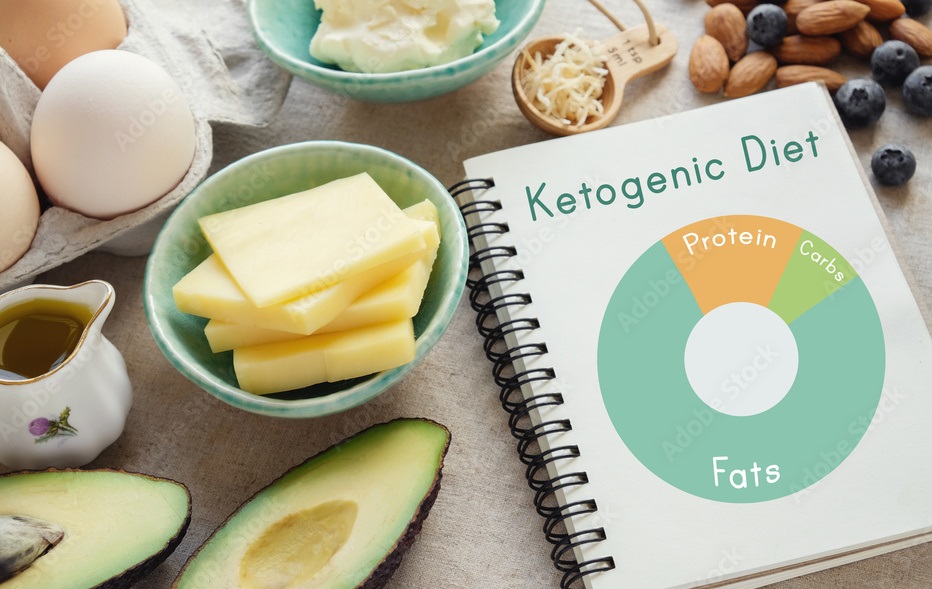Embarking on a ketogenic diet can feel like stepping into a whole new culinary world. For those unfamiliar, the keto diet is a high-fat, low-carbohydrate eating plan that has gained popularity for its potential to promote weight loss and improve various health markers. Central to the keto lifestyle is understanding what foods to embrace and which ones to limit. Let’s delve into a comprehensive keto diet food list to guide your journey towards ketosis.
What to Eat on Keto?
1. Healthy Fats:
- Avocado: Creamy, green goodness packed with healthy fats.
- Coconut Oil: Tropical magic for cooking and adding to your morning coffee.
- Olive Oil: Liquid gold drizzled over salads and veggies.
- Nuts and Seeds: Crunchy munchies like almonds and sunflower seeds.
- Fatty Fish: Think salmon swimming in omega-3 goodness.
- Full-Fat Dairy: Cheese, butter, and cream—because life’s too short for skim milk.
2. Low-Carb Veggies:
- Leafy Greens: Hello, spinach and kale salads!
- Cruciferous Veggies: Broccoli and cauliflower—the versatile stars of keto.
- Bell Peppers: Colorful, crunchy, and low-carb.
- Zucchini and Eggplant: The chameleons of the veggie world, perfect for keto recipes.
3. Quality Proteins:
- Meat: Grilled steaks and juicy burgers, anyone?
- Poultry: Roast chicken and turkey slices for protein-packed meals.
- Eggs: Scrambled, fried, or in omelets—eggs are your keto bestie.
- Seafood: From shrimp skewers to grilled salmon fillets, the ocean’s bounty awaits.
4. Low-Sugar Fruits:
- Berries: Sweet treats like strawberries and raspberries in moderation.
- Avocado: Creamy and dreamy, with just the right hint of sweetness.
5. Keto-Friendly Beverages:
- Water: Stay hydrated, friend!
- Herbal Tea: Relax with a cup of chamomile or peppermint.
- Coffee: Just hold the sugar and enjoy the rich flavor.
What to Limit on Keto?
1. Carbs:
- Grains: Sorry, bread and pasta—keto isn’t your jam.
- Sugary Foods: Candy and soda need to find new friends.
- Starchy Veggies: Potatoes, we’ll catch up another time.
- Processed Foods: Chips and cookies, it’s not you, it’s keto.
2. Sugars and Sweeteners:
- Table Sugar: Sweet, but not keto-friendly.
- Honey and Maple Syrup: Nature’s sweetness, but still too high in sugar.
- Artificial Sweeteners: Tricky—some are okay, but watch out for cravings.
3. Trans Fats:
- Processed Oils: Canola and corn oil, we’ll pass.
- Processed Foods: Check the labels—no hydrogenated oils allowed.
4. Alcohol:
- Beer and Sweet Wines: Sorry, guys, you’re too high in carbs.
- Sugary Cocktails: Skip the fruity mixers and opt for something simpler.
5. High-Carb Fruits:
- Bananas: Too sweet for keto’s liking.
- Grapes and Mangoes: Save these for special occasions.
Pros of Keto Diet
- Weight Loss: Keto diets can promote rapid weight loss, especially in the initial stages due to reduced carbohydrate intake and increased fat burning.
- Appetite Control: High-fat and protein-rich foods can help keep you feeling full and satisfied, potentially reducing overall calorie intake.
- Improved Blood Sugar Control: Some studies suggest that ketogenic diets may help stabilize blood sugar levels, which can benefit individuals with diabetes or insulin resistance.
- Increased Energy Levels: Once adapted to burning fat for fuel, many people report sustained energy levels throughout the day.
- Potential Health Benefits: Keto diets have been associated with improved markers of heart health, including reduced triglycerides and increased HDL (good) cholesterol levels.
Cons of Keto Diet
- Initial Side Effects: Many people experience “keto flu” symptoms during the adaptation phase, including fatigue, headaches, and dizziness.
- Restrictive Nature: Keto diets require significant restrictions on carbohydrate intake, which can be challenging to maintain long-term and may limit food choices.
- Nutrient Deficiencies: Since keto diets restrict many fruits, vegetables, and whole grains, there is a risk of micronutrient deficiencies if not carefully planned.
- Potential Health Risks: Long-term adherence to high-fat diets may increase the risk of certain health issues, such as kidney stones or liver problems, though research is ongoing.
- Social Challenges: Following a keto diet can be socially isolating, as many social gatherings and restaurants may not offer keto-friendly options.
Conclusion:
Navigating keto is like having a supportive friend by your side—encouraging you to savor delicious, wholesome foods while gently steering you away from the ones that don’t align with your goals. With this keto food buddy as your guide, you’re ready to embark on a delicious and satisfying journey towards better health and well-being. So, grab your shopping list, stock up on keto-friendly goodies, and let the adventure begin.
